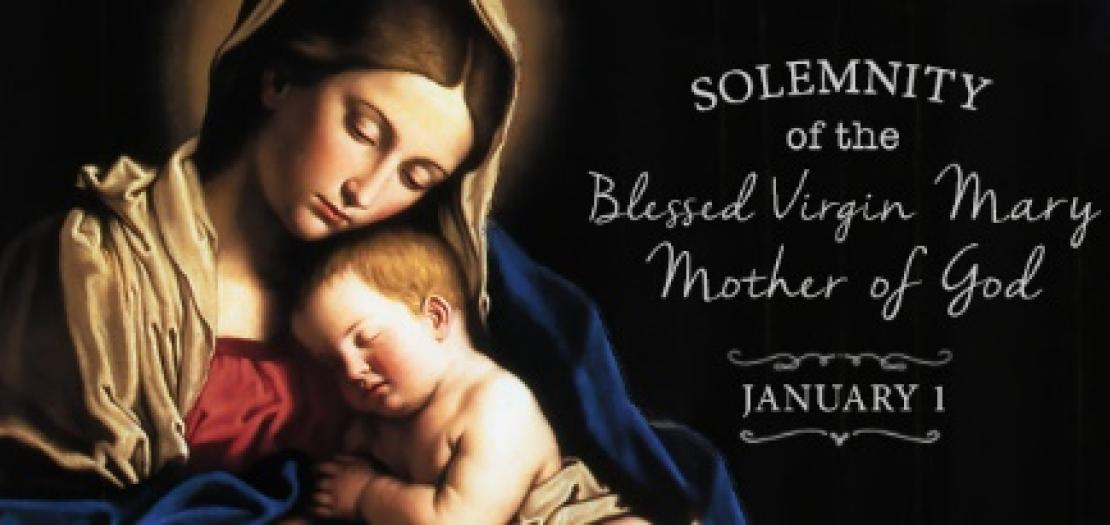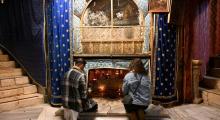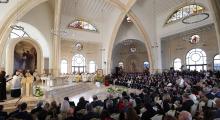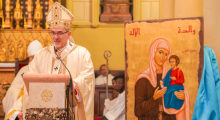Issued by the Catholic Center for Studies and Media - Jordan. Editor-in-chief Fr. Rif'at Bader - موقع أبونا abouna.org

Following is the text of the homily solemnity of Mary Mother of God on World Day for Peace by Cardinal Pierbattista Pizzaballa, Latin Patriarch of Jerusalem, dated January 1, 2025:
Dear brothers and sisters,
may the Lord give you peace!
On this day dedicated to Mary, the Mother of God, we are invited to pray in a special way for peace in the world. And first of all, for peace here in the Holy Land, in our country, where it seems to be unknown. Indeed, there are so many generations that have followed one another without knowing it. And perhaps we are now in one of the worst moments in terms of possible prospects for peace. Talk of peace that today seems far removed from reality.
Never before have political and even religious institutions, including ourselves, shown their weakness as clearly as at this time. The wait for just and true peace solutions for the peoples of this Land seems to be thwarted again and again by events that rather say the opposite. We have no one to turn to in these difficult times and in our wounded country. Someone to whom we can direct our desire for peace, and our willingness to work together to build relationships characterized by justice and dignity for all.
But this day is not just for reflection or discussion about the prospects for peace. It is first and foremost dedicated to prayer for peace. And that already takes us into another dimension. Without looking upwards, without accepting the gift that God has given to humanity, Jesus Christ, true God and true man, we will hardly have the means to interpret these difficult times. We will hardly be able to keep the doors of our hearts open to the sincere desire for peace and believe in its realization. Instead, we would be crushed by the burden of mistrust and resignation.
So, the Gospel we have heard helps us to enter into this dimension and to look at this time of ours in a different way, freed from human fears.
“So they went with haste and found Mary and Joseph, and the child lying in the manger.” (Luke 2:16)
Now that we are pilgrims of hope on the open road of the Jubilee, we feel close to the shepherds who, called by the angels, decided “ with haste, without hesitation” to go to Bethlehem to see what they had heard. Immediately before the Gospel, in fact, we heard the shepherds say to one another: “Let us go now to Bethlehem and see this thing that has taken place, which the Lord has made known to us.” (Luke 2,15) The term used by the evangelist is rema (ῥῆμα), which means not only “thing” but also “word”. St. Jerome even translates it as “verbum.” (“et videamus hoc verbum, quod factum est...”) The shepherds go to see the fulfillment of a word, a saying of the Lord, and this word is Jesus, as eight days after Christmas the Child was called.
I am more and more convinced that peace, real peace, which we are calling for with insistence today, comes above all from the decision to listen to the word that God tells us, to go and see this Jesus, that is, to welcome him and to become his disciples.
Listen, without hesitation: we live in times and days when everyone is talking about peace, apropos and off the cuff, in newspapers, on television, on social media, proposing analyzes, interpretations, strategies, solutions. We have seen how many illusions and frustrations this created for us. We all talk about peace, but few listen to peace. Yes, because Peace speaks, but no one or only a few listen to it. In fact, Peace speaks a language that only those who decide to go and “see” it with haste, like the shepherds, understand. The voice of peace can only be heard by those who seek it, by those who set out on the path, by those who are ready to recognize in a Child, who is to be welcomed and loved, the true power that saves the world. Peace can only be found by those who are willing to give space to what the Lord makes known to us, and not just follow their own thoughts and desires for power. The shepherds long to go, long to see the new things that God is preparing.
And so today I want us all to ask ourselves to what extent we are ready to listen to peace more than to talk about it, to seek it more than to wait for it, to walk towards it more than to expect others to do it, more than to wait for others to achieve it, more than to commit ourselves to building it personally. Even here in our country, marked by so much hatred, there are still many people who long for peace and are working for it. Are we ready to seek them out in order to realize other contexts of life with them? Do we have the courage to meet each other, without fear of the opinions of others, without fear of the inevitable misunderstandings?
Finding: The shepherds found the child and, full of joy, they recognized in Jesus the gift of God and thus received that peace of which today’s first reading speaks, the famous blessing of Aaron that we often use in our celebrations: “The Lord look upon you and give you peace!” (Num. 6,26) They had gone to know, and they came to recognize. In this Jubilee Year, and more generally in all our personal, social and even ecclesial lives, we need to move from knowing to recognizing.
We know Jesus, we know the way He opened, but perhaps we do not recognize it sufficiently. It is a struggle within us, within the unbeliever in us, to accept Jesus, to make ours His thoughts, His feelings, His cross. Finding Jesus means recognizing that the gift He is to us must be transformed into forgiveness for our brothers and sisters. Finding Jesus means walking in His way, taking up His cross, that is, His way of acting and loving.
True peace is a gift, but it is also a patient, arduous task that consists of abandoning one’s own selfishness and pretensions, in order to enter into the logic of the Kingdom of God. Without this willingness to become disciples of Christ, we may be capable of truces and compromises, but we will not experience true peace. This only comes from the cross, which is not a willingness to pain and death, but a decision to give oneself to the end, in the sure hope of the fruitfulness of Easter.
I believe this is the truest contribution we Christians can and must make to the cause of peace: to remind everyone that peace will never simply be the result of human agreements. We have seen what effect these agreements have. Instead, it will always come from the “more” of love, true love, which is the fullness (and not the opposite) of justice, and which, whether we realize it or not, bears for us the face and name of Jesus, who was born dead and rose again for us.
So may the Child of Bethlehem, together with the Virgin, the Mother of God and our Mother, continue to kindle in each of us, in our ecclesial community, that love which alone can give us the strength and courage to begin anew, to listen to peace, to recognize it in the person of Jesus and to realize it again and again, without ever growing weary, here, in our community and in our civil society.
Happy New Year!
 Jerusalem: Augusta Victoria Hospital offers free treatment for Gaza children diagnosed with leukemia
Jerusalem: Augusta Victoria Hospital offers free treatment for Gaza children diagnosed with leukemia  Text of meditation by Cardinal Pizzaballa, Latin Patriarch of Jerusalem, for second Sunday of Christmas
Text of meditation by Cardinal Pizzaballa, Latin Patriarch of Jerusalem, for second Sunday of Christmas 




